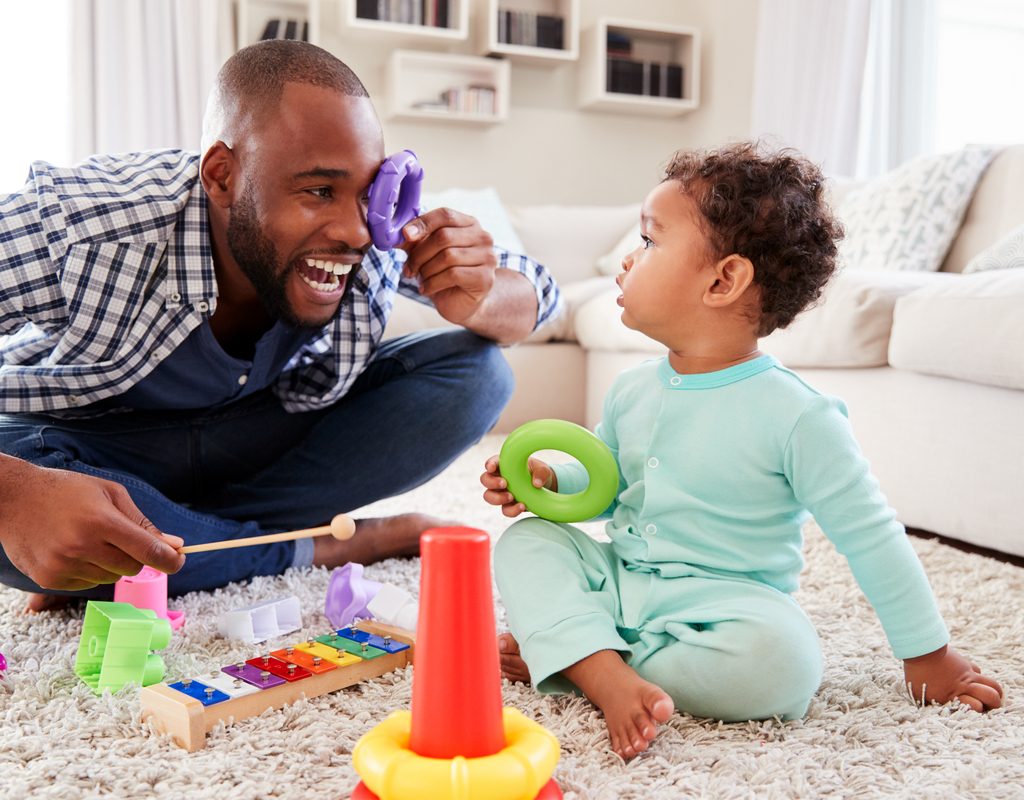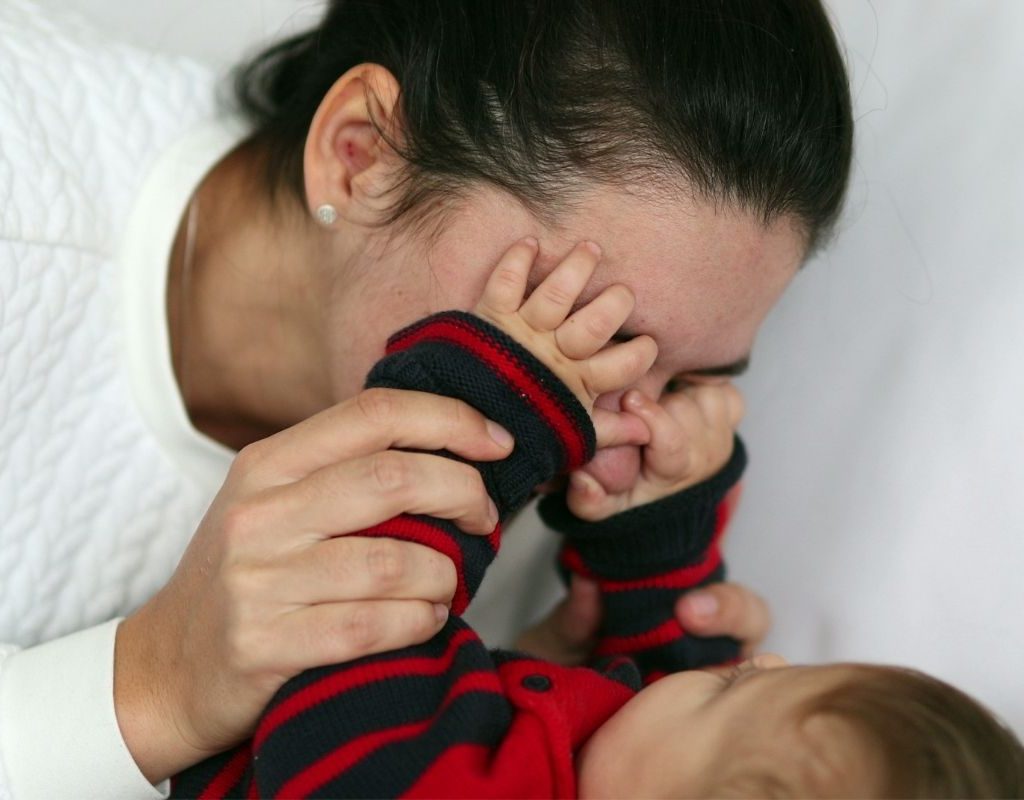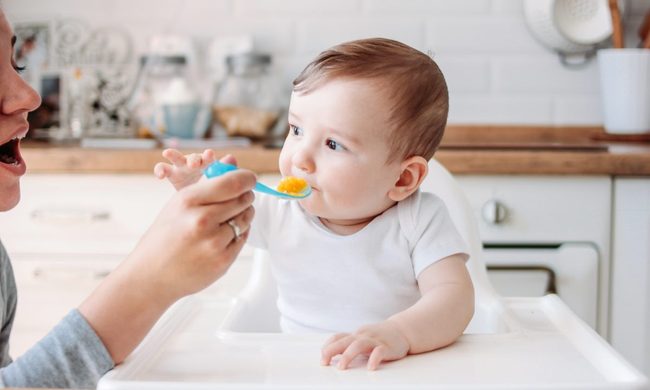
Peekaboo, I see you! The classic game of peekaboo teaches so much more than anyone could guess based on how simple it is to play. It’s free, easy, and it builds your baby’s brain up each time you play. But what if they’re not interested? Does it matter if your little one never wants to play this adorable game? We’ll go over when babies play peekaboo and when (and if) parents should worry if they don’t show any signs of wanting to play the game.

Why should babies play peekaboo?
Babies gain a lot from the seemingly simple game. It’s not only a game to play because it’s so simple or because your baby doesn’t need to talk to play it. There are plenty of upsides to this fan favorite.
Benefits your baby will see
- Visual stimulation creates new brain cell connections, and the repetition strengthens them.
- They learn socially about taking turns, eye contact, smiling, and give-and-take.
- The game builds gross motor skills and strengthens visual tracking.
- Laughing enhances learning (one survey showed peekaboo is the best way to make any baby laugh).
- Peekaboo develops the idea of object permanence, the idea that something out of sight is still there.
- It gives them an adult’s undivided attention.
- It builds trust that you will always come back.
“It’s a fun game, it’s a joyful game, but it’s actually getting at an emotional core for the toddler,” said Tovah Klein, director of the Barnard College Center for Toddler Development and author of How Toddlers Thrive. “They’re saying to the child, ‘I’m here for you every time you leave. I’m not going away.'” The game could help rebuild trust with traumatized children this way.
Having your smiling face come out from behind your hands isn’t hard to do, but your smiling face looking at theirs is one of the most important and beneficial foundations for your baby’s development. Even without all the other benefits, this one alone makes it worth it.

When do babies play peekaboo?
Babies love peekaboo from the newborn stage all the way up through toddlerhood. The concept of object permanence develops anywhere from 4 to 12 months old, and the idea that you’re really “gone” will begin to fade then. However, waiting for you to come out of hiding is still fun, even if they don’t think you’ve truly disappeared anymore. Their love of the game stays throughout, from when they begin to grasp the concept to while trying to figure out if you’re really gone or not. It’s all part of the fun for them.
Even without the idea of object permanence, babies love the surprised and smiling expression you make when you pop out. Reactions to facial expressions begin around three months old, and it is what parents live for.
Babies’ reactions to peekaboo develop as they do. At three months old or younger, they may smile or coo at you when you play. At 3-6 months old, a baby begins to visually follow your face where it reappears. At 6-9 months old, they may laugh at the game, and at 9+ months old, they may imitate or initiate the game.
Like with all milestones, expected ages are just averages and guidelines to give you a general idea, not a rule. If a baby isn’t reacting to facial expressions on the day they turn 3 months old, it’s no reason to panic. It becomes more of a cause for concern when it’s months and months beyond the milestone guideline age and the child is still not showing any interest.

Tips for playing with your little one
Make sure you have the right environment
There are better times to play peekaboo with your little one that could also correlate to them being interested in playing or not.
- Make sure baby has a full belly – Hungry babies don’t want to play anything other than the give-me-food game.
- Play after baby has rested – Trying to play right before naptime won’t have anyone happily playing anything.
Don’t stop playing just because baby isn’t interested
Your little one might not be full-on happily laughing when you play peekaboo. But look at your baby. Is your child engaged? Following your face? Looking at your hands? Your babe doesn’t need to give you a giggle every time.
This one might take more practice, depending on your baby. Keep playing as long as they are showing any form of interest in what you are doing. They will still learn, develop, and grow this way. Unless your little one is crying in your face to stop, don’t stop playing this game until they are old enough to tell you they don’t like it anymore.

When should I be concerned if my baby doesn’t play peekaboo?
Not playing peekaboo is not a reason to call the pediatrician between check-ups, but you should definitely bring it up with your baby’s doctor the next time you go if you are concerned.
Babies begin laughing around 4 months old, but if they aren’t, don’t automatically worry. Babies all develop on their own time but discuss any missed milestones like this with your pediatrician.
Unlike a physical milestone like walking, laughing is about personality, and some kids are naturally serious. Some babies may never show interest in peekaboo because they prefer other games and that can be chalked up to individuality.
Not showing an interest in peekaboo isn’t necessarily a reason to worry on its own, but you and your pediatrician will look at your whole child and see if it fits with other personality traits and parts of their development that all together could help hint at a future diagnosis. Not playing peekaboo on its own cannot lead to any diagnosis without other contributing factors.
It’s not so much about when babies play peekaboo, as how it is how the game of peekaboo goes with your child. Watch your baby to see how they react, keep playing for as long as they let you, and enjoy the simplicity and ease the game before your child is old enough to beat you at real games like Uno.




